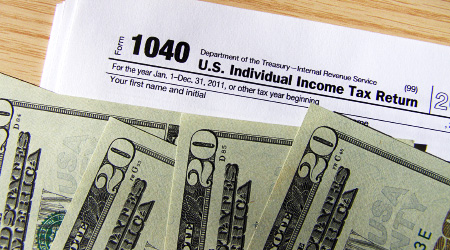6 Tips to Get Organized for Income Taxes

Filing personal income taxes is only as complicated as your personal financial situation. Most individuals don't have offshore investments or own shell companies so their taxes are relatively straightforward. Much of the work related to filing income taxes is in organization and preparation throughout the year. Keeping a folder for business-related expenses or making an ongoing list of charitable contributions makes it easier come tax time.
1. Organize Your Information
Scrambling to find all pertinent tax related records is what overwhelms most filers as they get closer to the April 15 tax filing deadline. Having a specific location for tax related documents such as mortgage interest or dividend statements means all information is readily at hand when you need it. Even if you don't prepare your taxes yourself and have a professional do it for you, there will still be a need to gather together all of the information ahead of time.
2. Calculate Your Income
The state and federal government are interested in all sources of income not just what is provided by your employer on a W-2 form. This includes any income generated from gambling in the form of winnings and investments in the form of capital gains. You may also receive various types of 1099 forms depending on what type of income you receive and from what sources. The two most common are a form 1099-DIV which is filed by organizations which pay you dividends and interest and the other is a form 1099-MISC which is for all income over $600 paid by a single entity.
For example, if you work as an independent contractor for a month doing consulting work for a business they may pay you $750 in compensation and will file a 1099-MISC with the federal government. You then have to report this as income on your personal taxes. Be sure to understand what constitutes income and report all sources otherwise you could be audited and have to pay penalties and interest.
3. Locate Last Year's Returns
You may have to reference the prior year's tax returns to refresh your memory on sources of income and deductions or charitable contributions. It is also handy to have them available for Social Security numbers if you don't know them already. If for whatever reason you don't have access to your prior years tax returns you can request a transcript from the Internal Revenue Service at their website.
4. Compile Deductions
Many tax filers will claim the standard personal deduction as a simple way to minimize their tax burden when filing. There are certain situations however, were itemizing deductions can be more beneficial than the standard deduction. For situations where you have medical expenses more than 7.5% of your adjusted gross income or have spent significant financial resources seeking employment or receiving job-training, you may want to file a form Schedule A to claim itemized deductions.
5. Maximize Contributions
In order to encourage charitable giving, the Internal Revenue Service recognizes charitable contributions as an offset to adjusted gross income providing a tax benefit. Gifts of stock, personal property and cash are all acceptable but may require a computation of fair market value. Make sure your generosity falls within the guidelines as outlined on the IRS website such as what qualifies as a charitable contribution and what amounts need to be tracked on which schedules.
6. Allocate Your Refund
When your tax are ready, you can file them either manually using the USPS or electronically. The Internal Revenue Service's free eFile system allows you to submit your personal income taxes online and also received your tax refund electronically and expeditiously. When preparing your taxes, take some time to plan for how your refund will be used; ideally or paying down debt, building a cash emergency fund or creating an investment account.







